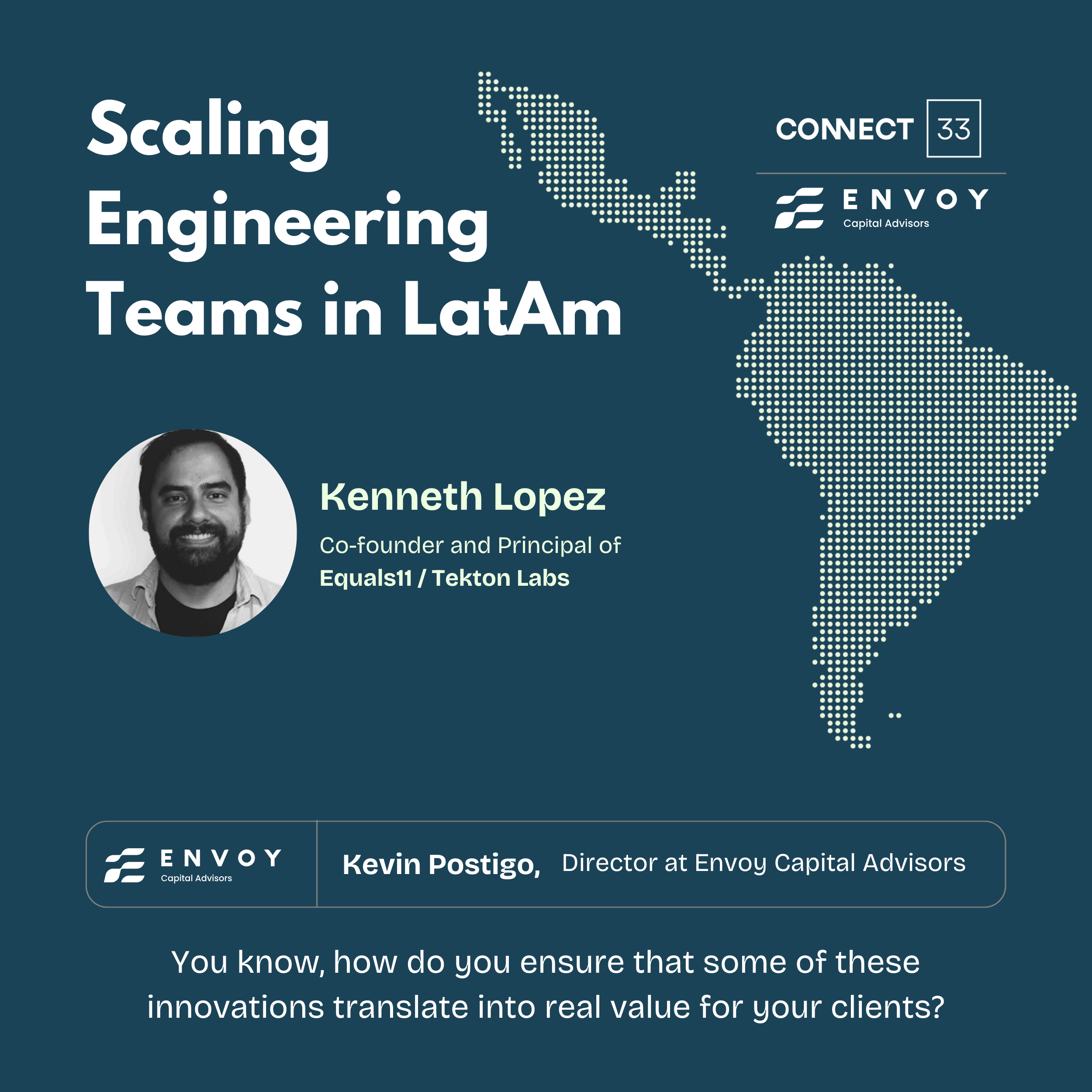Scaling Engineering Teams in LatAm: Kenneth Lopez, Equals11 & Tekton Labs

Kenneth Lopez is a Partner at Connect33. He previously founded Tekton Labs, a software development consultancy in Latin America, and now runs Equals11, a certified Salesforce consultancy.

Q&A
What is your background and current business venture?
My background is in computer science, and I've been building tech companies since I was in school. About 15 years ago, I founded Tecton Labs, my first consulting firm. During that journey, I realized there were opportunities beyond just consulting, which led me to create Boring Holding - a parent company designed to build different products and services.
One of the companies under Boring Holding is Equals 11, a post-implementation consulting firm focused on Salesforce. Unlike traditional implementation partners, we specialize in taking existing implementations and elevating them through optimization, automation, and fixing implementation issues.
Why did you create Equals11 specifically for Salesforce consulting?
Boring Holding was created to explore ventures beyond pure service-oriented consulting. While Tekton Labs designs products using various technologies without focusing on any specific platform, Equals 11 was established to create value on top of established platforms - currently Salesforce, but potentially SAP, Oracle, or others in the future.
The decision to focus on Salesforce was strategic. We identified a significant market gap: companies that are too small for the "big four" consulting firms but too large for smaller implementation partners. These mid-market clients have the budget but can't afford the premium rates of larger firms. We've mastered serving this sweet spot efficiently, providing high-quality services tailored to their specific needs.
Why do you continue to build software services companies in Latin America?
I focus on Latin America for several key reasons:
1. Cultural Understanding: Being from Latin America myself, I understand the regional culture, which is crucial when building effective teams.
2. Cultural Alignment with the US: Latin American business culture aligns well with the US market, which is our primary target.
3. Quality Talent: The region offers the same quality of talent as other global regions, with professionals who can deliver excellent results.
4. Time Zone Advantage: Latin American countries operate in the same time zones as the US, allowing for real-time collaboration.
5. Cost Efficiency: While not as pronounced as before, a cost advantage remains compared to US-based teams.
Most importantly, I view Latin America as a map of centers of excellence, with each country offering different educational backgrounds and professional profiles. For example, Argentina and Uruguay excel in complex technical challenges due to their university systems, while Peru is strong in product-based, web, and mobile development. This allows us to assemble teams leveraging the specific expertise of different countries.
How do you decide which Latin American countries to expand into?
It depends entirely on what we're trying to build. For Salesforce specifically, we're scaling our team in Brazil because our research showed that Brazil and Argentina have the strongest Salesforce talent pools, with Brazil taking the lead. If I were building a team focused on microprocessors or more specialized technical work, I would likely choose Argentina.
Beyond technical considerations, we also evaluate local laws and regulations. Each country has different restrictions and requirements for building teams, which must be factored into expansion decisions.
Rather than concentrating all our talent in one location, we maintain a distributed model. While having teams in a single location can facilitate culture-building and in-person gatherings, it also restricts access to talent. Our remote-first approach allows us to hire the best people regardless of location - currently, our Salesforce team includes professionals from Brazil, Argentina, Peru, Spain, and the Netherlands.
Which industry verticals are you currently serving?
We initially planned to focus on financial services and healthcare based on my prior experience. However, we quickly discovered an unexpected opportunity in the nonprofit sector. Many nonprofits receive Salesforce licenses at reduced or no cost but lack the expertise to implement and optimize the platform effectively. We help them bridge this gap - showing them not just how to use Salesforce as a database but how to leverage its full capabilities.
Manufacturing has emerged as our second key vertical, particularly for companies migrating from legacy platforms to Salesforce. We're also growing our presence in healthcare, though it remains a smaller portion of our business currently.
The beauty of our approach is that we focus not just on understanding vertical-specific processes but on mastering the Salesforce ecosystem itself. This allows us to add value across different industries by identifying which tools and approaches will deliver the most impact for each client's specific needs.
How are different industries adopting AI and Agent Force capabilities?
We're seeing adoption across all verticals, though in different ways. One area with significant recent demand is digital marketing agencies. These organizations collect vast amounts of data from social media but struggle to process it effectively and integrate it with their CRM systems. They need consistency between campaign metrics from platforms like Google and their internal CRM data.
Agent Force, Salesforce's AI offering, is designed to be implemented across all verticals. While large enterprises may require highly specialized implementations, most organizations can benefit from standard implementations with customizations tailored to their specific needs.
My perspective is simple: if you're not leveraging the new capabilities in the Salesforce ecosystem, you're missing the wave. And these tools are increasingly accessible and user-friendly.
Where do you see the biggest growth opportunities in Salesforce consulting over the next five years?
I see two primary growth areas:
1. Evolving the Consulting Process: Traditional consulting often involves providing recommendations without ensuring implementation success. The complexity of today's Salesforce ecosystem requires a more integrated approach. During discovery, we gain comprehensive insights that naturally position us to help with implementation. Without this continuity, clients risk failed implementations or optimizations. The future of consulting must bridge discovery and execution.
2. Talent Acquisition and Retention: Finding the right talent for Salesforce work is challenging. Interestingly, traditional software engineers aren't always the best fit because they tend to default to coding everything from scratch rather than leveraging the platform's capabilities. This approach creates maintenance issues when Salesforce updates occur. We need people who genuinely appreciate the platform approach and want to understand how Salesforce works at a fundamental level.
Beyond acquisition, retention is critical. Having the right people in the right positions prevents high attrition rates, which directly impacts quality and operational effectiveness. In the Salesforce ecosystem, constant team changes make it impossible to deliver consistent quality.
How do you approach talent acquisition and retention at Equals11?
For recruitment, we maintain what we call a "candidate list" - we're continuously interviewing potential team members regardless of current needs. This proactive approach means that when a client needs to scale quickly, we already know qualified developers and consultants who can join immediately.
Our organizational structure is deliberately horizontal with minimal layers. This works exceptionally well with the right people, giving them opportunities, responsibilities, and the freedom to experiment and occasionally fail. We believe everyone has a creative soul, and by encouraging that creativity rather than simply dictating tasks, we create an environment where talented professionals want to stay.
The key is finding people who are genuinely passionate about the Salesforce ecosystem and then giving them purpose and autonomy. This approach has proven effective for both attracting and retaining top talent.
Can you describe a typical client engagement at Equals11?
While I can't name specific clients, I can describe our work with a nonprofit organization. Like many nonprofits, they had access to Salesforce at no cost but were only using it as a basic database, missing out on its full potential.
Our engagement followed a structured approach:
1. Health Check: We begin with a quick diagnostic process to identify potential pain points - similar to a doctor's initial assessment. This reveals obvious issues without requiring a full discovery process.
2. Discovery: This is our comprehensive assessment - equivalent to medical tests that provide detailed insights. We evaluate the organization's Salesforce instance for security, best practices, and potential red flags.
3. Solution Design: Based on our findings, we develop modular solutions addressing specific needs - security enhancements, automation improvements, data cleansing, etc. We specify which components or platforms will be used for each solution.
4. Implementation: We execute the planned improvements, focusing on the client's objectives. For nonprofits, these typically include increasing donor numbers, growing donation sizes, improving donor communication, and ultimately enhancing fundraising effectiveness.
5. Ongoing Optimization: As the organization evolves, we conduct additional discovery processes to address new challenges. This creates a continuous improvement cycle.
In some cases, we also provide staff augmentation, supplying technical talent to complement the client's existing expertise after we've diagnosed their needs.
How do you measure success with clients?
Success metrics vary by engagement type:
- For Staff Augmentation: The primary metric is attrition - we aim to provide stable teams that remain in place for at least a year, unlike the industry norm where staff often changes every few months. We're selective about clients, declining to work with those whose culture would make team stability impossible.
- For Post-Implementation and Optimization: We measure success through quality improvements and reduction in errors. Many clients initially choose the cheapest consulting firms, which often fail to follow best practices (like working directly in production environments). By implementing proper processes, we demonstrate immediate value.
- For Strategic Consulting: We align with the client's specific pain points. For a nonprofit focused on fundraising, we might target specific percentage increases in donations. For other clients, metrics might include successful integrations, automation implementation, or security improvements.
Regardless of the engagement type, we always establish clear, measurable objectives that serve as our North Star throughout the project.
Do you plan to expand beyond Salesforce consulting?
While I'd love to explore opportunities with platforms like SAP, Databricks, or others, I've learned the importance of focus. For at least the next 24 months, we'll remain exclusively focused on Salesforce. The ecosystem is so vast that it would be unwise to diversify at our current size. Once we grow to around 400 people, we might consider creating separate divisions for other platforms, but not before then.
What's your outlook for the technology sector in 2025?
I'm optimistic about 2025, and not just because of the typical "new year effect." The economy is looking stronger than in previous years, which is positive for the entire technology sector. I'm seeing budgets being released and investments being made after two years of constraint.
The outlook for Salesforce specifically and the tech sector generally is very positive. Client budgets are loosening, and sales cycles are shortening - all indicators of a healthier business environment ahead.





